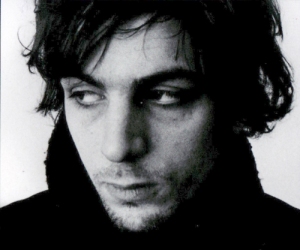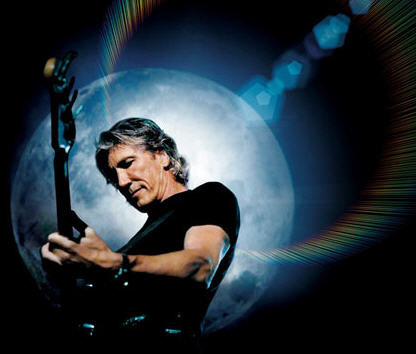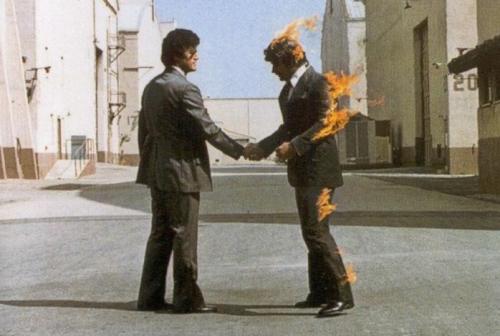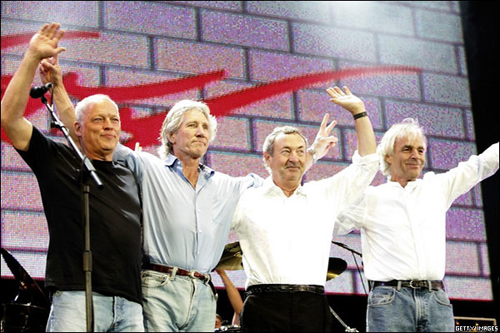Words cannot describe the impact Pink Floyd has made in my life, but I’m going to do the best I can in trying to do so.
A couple weeks ago, my roommate introduced me to this piece by Grantland’s Chuck Klosterman, a step-by-step examination of Led Zeppelin’s last show together in August 1979 at Knebworth. It was one of the more interesting reads I’ve ever come across and it gave me the idea to try writing something like it.
Well, yesterday as I was waiting for my laundry to be done, I went onto YouTube and found Pink Floyd’s reunion show at Live 8 in 2005 in its entirety, and it immediately took me back to July 2, 2005. It was two days before my Grandfather had passed away from an aneurism on the Fourth of July, and I was visiting him and my Grandmother along with almost everyone else from my father’s side of the family for the holiday weekend. I had waited anxiously all day for the Pink Floyd performance, for it was the first time Roger Waters had performed with David Gilmour, Rick Wright and Nick Mason since the early 1980s and the first time Waters and Gilmour had been on the same stage since his departure from the band in the mid-’80s. All of the other performances paled in comparison to the Floyd reunion performance, so here is my examination and input on the event that was deemed as likely to happen as soon as pigs had mastered flight.
To give a little background, Pink Floyd is my all-time favorite band. I began listening to the Floyd when I was in eighth grade – one of the most confusing and frustrating times of my life as I struggled to stay out of trouble at school as well as struggled to make friends while dealing with the awkwardness that middle school brought. Before I found Pink Floyd, I had no hope; I had no reason to look forward to the future. But the Floyd’s gracing melodies and superb, complex musical composition soothed me, giving me hope and reason to carry on, even when things got rough.
To this day, I can listen to Pink Floyd with my eyes closed and see a beautiful canvas as elaborate and ever-changing as the music itself. There’s nothing simple about their music, and even their simpler songs were just as good.

Co-founder Syd Barrett led the band through the psychedelic years until his departure during the recording of their second album, "A Saucerful of Secrets."
That’s why I always seethe at the thought of people associating Pink Floyd with psychedelic drugs. Aside from former frontman Syd Barrett’s drug habit that formed at the height of his involvement with the band’s preliminary success in the late ’60s, Waters said he and the other guys weren’t really into drugs all that much during that time period, then joking instead that they were strictly heavy drinkers.
Still, the period of experimentation that followed Barrett’s departure in 1968 didn’t help the Floyd shed its reputation as a drug-oriented band. But the positive to have come out of the period of experimentation was the development of the band’s direction heading into their 1971 release, “Meddle,” which paved the way for their groundbreaking album, “The Dark Side of the Moon” (which was originally titled “Eclipse” at that point and had even been performed in its entirety during its composition before they ever recorded it in the studio, something that bands typically don’t do).
Associating Pink Floyd with drugs is like equating a drought with rain – it simply does not associate with one another.
Pink Floyd’s influence has contributed a large part to who I am today, so this holds a very deep significance to me.
0:00 to 5:00 – Breathe/Breathe Reprise
Here it is, the moment we’ve all been waiting for. After 20-odd years of hostility toward one another, Roger Waters was finally rejoining the band that had achieved great things with him as a driving force for one show that had been broadcast on multiple channels. The sound of the heartbeat begins to echo in Hyde Park – they’re opening with “Breathe,” the opening track of “Dark Side.” It’s only fitting that they open with it, as it is one of their more-underrated pieces of music. Despite knowing their opening track, a wave of goosebumps fills my arms as my eyes well up with tears of joy when the band strikes that first note (1:10). No note has ever sent shivers down my spine as vibrantly as that first note did on July 2, 2005. I have reached total euphoria getting to see my favorite band perform live in my lifetime, as unlikely as even the idea of that was leading up to it.
Heaven. If it exists, this must be what it’s like.
David Gilmour on the steel-pedal guitar, Nick Mason on drums, Rick Wright at the keyboards, and Roger Waters on the bass, playing between Mason and Wright as he did for all those years. One interesting thing I notice is that Waters isn’t playing with a guitar pick, which is strange considering I had never seen him not use one in footage from their heyday. I always had a theory about Roger – he was a guitar player who was forced to play the bass. After Gilmour’s inclusion in the band in 1967, David soon proved to be a far superior guitar player than Syd Barrett, who was close friends with him. Waters occasionally played acoustic guitar for “Grantchester Meadows” and, later, “Wish You Were Here,” but he was always confided to the bass guitar in favor of Gilmour manning the six-string.
And just like that, Gilmour switches from the steel-pedal guitar to his signature all-black custom Fender Stratocaster, and just like that, the vocals are underway. The simple-yet-serene message of the song resounds deeply with me:
“For long you live and high you fly, the smiles you’ll give and the tears you’ll cry,
And all you touch and all you see is all your life will ever be.”
The lyrics caress the ear with a discouraging-yet-optimistic message that outlines how we, as people, will only amount to what we accomplish in life, but our impact on others may be greater than we think. It’s a message that is open for interpretation, but it has resonated with me ever since those confusing times of my teenaged youth.
Roger’s antics of mouthing the words to the song, which he doesn’t even sing, is a little irritating to see. I know he might be excited to finally performing with his former bandmates, but an eccentric pantomime of the song’s lyrics makes him look a little too happy to be there. David, on the other hand, has glimpses of not wanting to be there at all and having still not forgiven Roger for the fuss he made about the band’s likeness in the late ’80s when they wanted to carry on without him. To be fair, Gilmour won that dispute and went on to put out two crappy albums – “A Momentary Lapse of Reason” (1987) and “Division Bell” (1994) – that are essentially David’s wetdream fantasies of gliding over cliffs with feathery language and reminiscing about how beautiful the seaside during a sunset can be; and pardon my French, but those albums were fucking terrible. So I guess I’d rather have Roger’s enthusiasm over David’s stone-cold traces of reluctancy any day.
Probably one of their most famous songs, “Money” became the first single to reach the top 20 in the U.S. charts in 1973 – eight years following the band’s initial conception. It is one of the most famous and most recognizable songs composed in 7/4 time and combines the true grit that rock ‘n’ roll had been able to dish out before the dreadfully simplistic heavy metal years that coincided with AC/DC’s awfully simplistic and narrow-viewed, often annoying and half-assed, songs. “Money” along with its pure substance, also provided simple lyrics that were easily sung along to and easily understood. It was the first song I had ever learned on the bass guitar when I first started playing in December of 2005, and contains a bass riff that I will never be able to forget for as long as I live set in the key of B-minor.
Gilmour once recollected that the band – even including the time after Roger’s departure – had played “Money” over 800 times, making it the most-performed song they have ever composed. With that being said, you would kind of expect them to play this one judging from its popularity and timeless home in rock history.
Gilmour finally cracks a smile – maybe he actually didn’t mind performing with Roger after all. He nails the simple-yet-meaningful lyrics entailing the role money plays in our lives – a theme as timeless as the sun’s role in brightening even the cloudiest of days. Roger continues his pantomime of lyrics, though, continuing to make himself look foolish.
After the first two verses, Dick Parry emerges to perform the saxophone part before the 4/4 time switch. Parry had originally played the saxophone on the track during its recording, so to see him join in again was rewarding to see to say the least. Getting another saxophonist would not have cheapened the piece by any means, but to have Parry perform in the reunion makes it much more genuine. Parry misses a few notes, but his performance still does its part leading into the time change.
And here’s the time switch (8:07) – which contains the guitar solos by Gilmour that are played in 4/4 time as opposed to the original 7/4 signature. The change sounds absolutely spectacular, but at one point, the camera pans past Rick Wright, who I notice does not have a microphone in front of him, which, now knowing he would die three years later from an undisclosed form of cancer he had been battling for some time, led me to believe he was in too ill of shape to be singing. Wright provided good backup vocals to Gilmour at best, but you would always feel a little cheated during songs in which he only sang (“Remember a Day,” “Summer ’68,” etc). Regardless, Wright’s last performance with the band is still a memorable one.
At 10:12, we come back to 7/4 time to play the song out. At this point, David is thinking to himself maybe this reunion wasn’t such a bad idea after all; maybe the 4/4 guitar solos were just what he needed to give himself some life to the idea of once-again performing with someone who he once felt a mutual hatred toward. For the moment, all of that was brushed aside as the band transitions to an admittedly emotional song, and one of David’s favorite pieces of music to play.
11:46 to 16:02 – Wish You Were Here
Perhaps the most haunting thing for the band during its successful years was the memory of former bandmate and co-founder Syd Barrett. In 1975, after the success they had achieved with “Dark Side,” they made an album aptly named as a tribute to Syd, “Wish You Were Here.”
It’s a nice gesture geared toward someone who had gotten off the train before its ride went straight to the promiseland, someone who missed out on being a multi-million-dollar rock star. But I guess it’s OK, because was still dear friends with them, despite living the rest of his days as a recluse until his death on July 7, 2006.
During the making of “Wish You Were Here,” Syd had visited them in the studio. However, the group didn’t recognize him at first because he had gained a bunch of weight and had his head shaved. When they asked what he had been up to, he replied, “I’ve been eating a lot of pork chops.”
Roger, who now has an acoustic guitar along with Gilmour, announces the sentimental meaning of this song to the band as Syd watches the performance from his obscure apartment building with a cigarette burning its way into the crevasse of his fingers. In all honesty, I don’t think Pink Floyd would have achieved the success that it did with Syd Barrett as its frontman. That is incredibly arbitrary though and could be completely false. But as with any similar anecdote of a missed opportunity, queries about Syd can only be made with “what if” at the beginning.
At 12:42, Gilmour begins the opening riff, which he plays brilliantly while in the daze of not caring how much he still somewhat disliked Roger and his egotistical ways. Again, the hard feelings had been put aside, especially for a song with as much emotion as this one.
The crowd can be heard singing along with David during the opening verse as he sings the lyrics like poetry read from the girl in class who was too afraid to talk but was much brighter than anyone else in the room. “Do you think you can tell?”
For the next verse, Roger sings. Yes, Roger sings. Roger admits his vocals are awful compared to Gilmour’s; but with an obligation to chime in and play his part, Waters takes the next verse as Gilmour can only smile at Nick as if Nick had persuaded him to let Roger sing just to stop the bellowing complaints that would have come as a result of not letting him do so. Of course this is speculation, but I doubt it’s far off from the truth.
Roger finishes singing as David begins sing-humming (I don’t know what it would be called) the notes he plays as he did so in the studio recording. It’s more recognizable that he’s sing-humming than in the studio version of the song, but then again there is a camera pointed at him.
David and Roger share the vocals for the final verse of the song before they fade out to an uproar of cheers in preparation for their final song. Oh if only I could have been there.
 16:30 to 24:00 – Comfortably Numb
16:30 to 24:00 – Comfortably Numb
Here we are: the final song to ever be performed by all four members of the band on stage. It’s rather suiting that it’s “Comfortably Numb” – the literal feeling of every Pink Floyd fan from later generations who actually got to see the four perform live one last time. Of course it would be a song that was one of the main reasons for the disputes between Roger and David, whether so-and-so wrote this-and-that part of the song, who deserved credit for blah blah blah. Still, it’s one of David’s favorites and one of their most popular songs, so why not finish the bill with a strong song?
Roger’s movements continue to be oblong and irregular even when he isn’t pantomiming to lyrics, making me wonder if there’s something actually wrong with him during this performance.
At 17:22, David begins the chorus of the song – a sensation equivalent to that of descending down a steep roller coaster for the first time in your life – still holding up with a good vocal performance despite sounding exhausted after resisting his urge to strangle Roger from across the stage (Again, speculation, but probably somewhat accurate).
Still, the chorus and solo tie-in is performed beautifully and blissfully, validating any optimism that came with quesitoning whether or not they should even do a reunion show.
Then we go back to verse No. 2, where Roger’s sub-standard singing leaves you with a cheap, empty feeling of having just eaten the most delicious thing in the world immediately followed by a mouthful of maggots and lemons. Yes, Roger is one of the biggest influences in my life and his days pioneering Pink Floyd through all of the inspirational music he helped compose were that of pure gold, but he was not the best singer in the world. Still, it doesn’t hurt to hear him sing on some songs. I’ve always liked that Pink Floyd never had just one member sing, but rather they were selective in who sang what, which is something you sadly don’t see nowadays.
19:46 – the second chorus by Gilmour, and a painful feeling in the gut in every Floyd faithful that the end is soon near – for good this time. Gilmour’s last chorus with the band carries significance:
“When I was a child I caught a fleeting glimpse out of the corner of my eye,
I turned to look but it was gone, I cannot put my finger on,
And now the child has grown; the dream is gone.”
The dream is gone. At about this time, the annoying announcers of the event on Mtv and Vh1 and whatever other channels this was being broadcast on tuned out the final solo and began talking as they normally do: saying something nobody, at this time, cared about while forcing viewers to try to tune out their voices to hear the final echoes of the band’s performance.
I guess that was it.
Rick Wright has since passed. Gilmour has gone on tour. Waters has gone on tour. The two have performed together once or twice, but nothing to the caliber of the final four songs they performed on the eve of July 2, 2005 in Hyde Park in London.
Getting to see it as it happened, knowing where I was when it happened, knowing the significance of that show, it was all worth it. It would not have been a big deal if Pink Floyd didn’t mean so much to so many people, but the entire Live 8 festival was centered around the Pink Floyd reunion show, which delivered what it promised and left me and millions of others, quite suitingly, comfortably numb.




